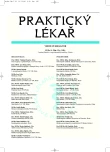-
Medical journals
- Career
Entecavir is new drug for chronic hepatitis B treatment
Authors: J. Stránský
Authors‘ workplace: I. interní klinika FNKV a 3. LF UK Praha přednosta prof. MUDr. Jiří Horák, CSc. 10
Published in: Prakt. Lék. 2006; 86(7): 391-392
Category: Of different specialties
Overview
The antiviral treatment of chronic hepatitis B by interferons was significantly extended in last decade by synthetic nucleosides and nucleotides which are given perorally. Lamivudin (100 mg/day) was the first, adefovir dipivoxil (10 mg/day) was the second drug, and nowadays extensive clinical trials are continuing with entecavir (0.5 mg/day) which is an analogue of guanosine with high and selective antiviral activity against hepatitis B virus. It is given to HBeAg positive and negative patients with chronic hepatitis B and serological markers of viral replication. In comparison of entecavir to lamivudine treatment there was significantly higher histological, virological and biochemical improvement in entecavir. Safety and tolerance profil was similar in both drugs and no antiviral resistence to hepatitis B virus was meanwhile observed during 12 moths entecavir treatment.
Key words:
chronic hepatitis B, antiviral treatment, entecavir.
Labels
General practitioner for children and adolescents General practitioner for adults
Article was published inGeneral Practitioner

2006 Issue 7-
All articles in this issue
- Epidemiological overwiew of alcohol consumption in SR and CR
- WHO algorithms of integrated management of childhood illness at primary health care level
- Recent advances in the pain pathophysiology and theirs possible applications for the treatment of pain.
- Entecavir is new drug for chronic hepatitis B treatment
- Post-exercise acute rhabdomyolysis – benign sign or symptom of serious muscular disease?
- Recommended diagnostic steps for general practitioners attending patients with difficulties that could indicate multiple myeloma
- The diagnostic process in primary health care – the most frequent sources of errors and possibilities for their elimination
- General Practitioner
- Journal archive
- Current issue
- Online only
- About the journal
Most read in this issue- The diagnostic process in primary health care – the most frequent sources of errors and possibilities for their elimination
- Post-exercise acute rhabdomyolysis – benign sign or symptom of serious muscular disease?
- Entecavir is new drug for chronic hepatitis B treatment
- Recommended diagnostic steps for general practitioners attending patients with difficulties that could indicate multiple myeloma
Login#ADS_BOTTOM_SCRIPTS#Forgotten passwordEnter the email address that you registered with. We will send you instructions on how to set a new password.
- Career

